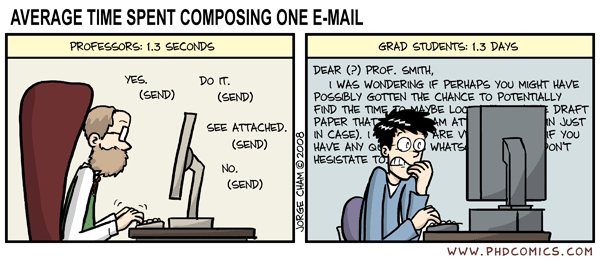Last week's post resonated with many of you, so I'm happy to present part 2. It turns out that the things I'm writing about, and that I thought I was clever enough to have thought up on my own, are already on the radar of universities, grad students, and alt-ac professionals. They are known as transferable skills, and many people more informed than I am have written great pieces about them. But I'm certainly happy to add my voice to the chorus that, besides your research, you are gaining useful and valuable skills as a graduate student. Here we go:
6. How to communicate effectively.
This might seem lame, but you have been engaging in intense multi-platform communication while a student, and you surely have come across instances of poor communication. Sometimes extremely poor communication. Busy professors whose emails are indecipherable, undergraduates who can't form a coherent paragraph, department-wide memos advertising a talk that don't provide the timeslot, or websites whose design hinders your information-gathering quest. But you haven't just learned what not to do: your sanity as a grad student involves effective communication with your professors and undergraduate students. Writing a brief and clear email means that you don't have to write a clarifying one later, and through trial and error your ability in this area has improved.
7. How to be a mentee. Either informally or through formal channels, you have been mentored by those more advanced in their degrees and by professors. Being a good mentee has helped you avoid pitfalls and promote your progress (which courses to avoid, how to deal with an absentminded supervisor, how to apply for a job). The more you asked questions and requested advice, the better your understanding of your own goals became. This is an extremely transferable skill, as any job with multiple workers is a setting for productive learning from others.
8. How to be a mentor (and how not to). Related to #7 above, you may have been the recipient of excellent, atrocious, or mediocre mentorship from your superiors. You know the kind of support and feedback that has been helpful or inspired, and you know firsthand (or have heard stories about) terrible mentorship from absent, inconsiderate, or inconsistent professors. You therefore will be in a much better position to mentor others, because you have learned what not to do: don't miss meetings, don't promise something you can't deliver, don't have wildly different expectations than those you have communicated, and so on. And you know what a difference a good mentor makes. You may even have had practice through your dealings with undergraduates, by writing a letter for someone you've taught or by giving advice about selecting a graduate school.
9. How to network. I don't mean the secret-handshake, sneak into others' conversations, how-to-succeed-in-business-without-really-trying kind of networking, which always makes me feel like hiding under some coats until the cocktail reception is over. You have naturally developed your networking skills by meeting other academics at conferences or talks, emailing people whose work you find interesting, or requesting speakers or papers for any conferences or journals you have helped organize. Even asking a professor to sit on your committee is a kind of networking. The benefits of being able to network in a job outside of academia are fairly obvious.
10. How to know what you want to do (and what you don't want to do). With very few, fortunate exceptions, every grad student has worried about whether they are in the right place and decided (at least, tacitly) that school is the right choice for them, for now. Anxiety and impostor syndrome are rampant among grad students, and we engage in loads of self-reflection about our skills, interests, prospects, and current satisfaction with what we're doing. This is actually a mixed blessing, because if you find yourself in a terrible job in the future, you will more easily be able to weigh your options and decide when enough is enough.


Comments
Post a Comment